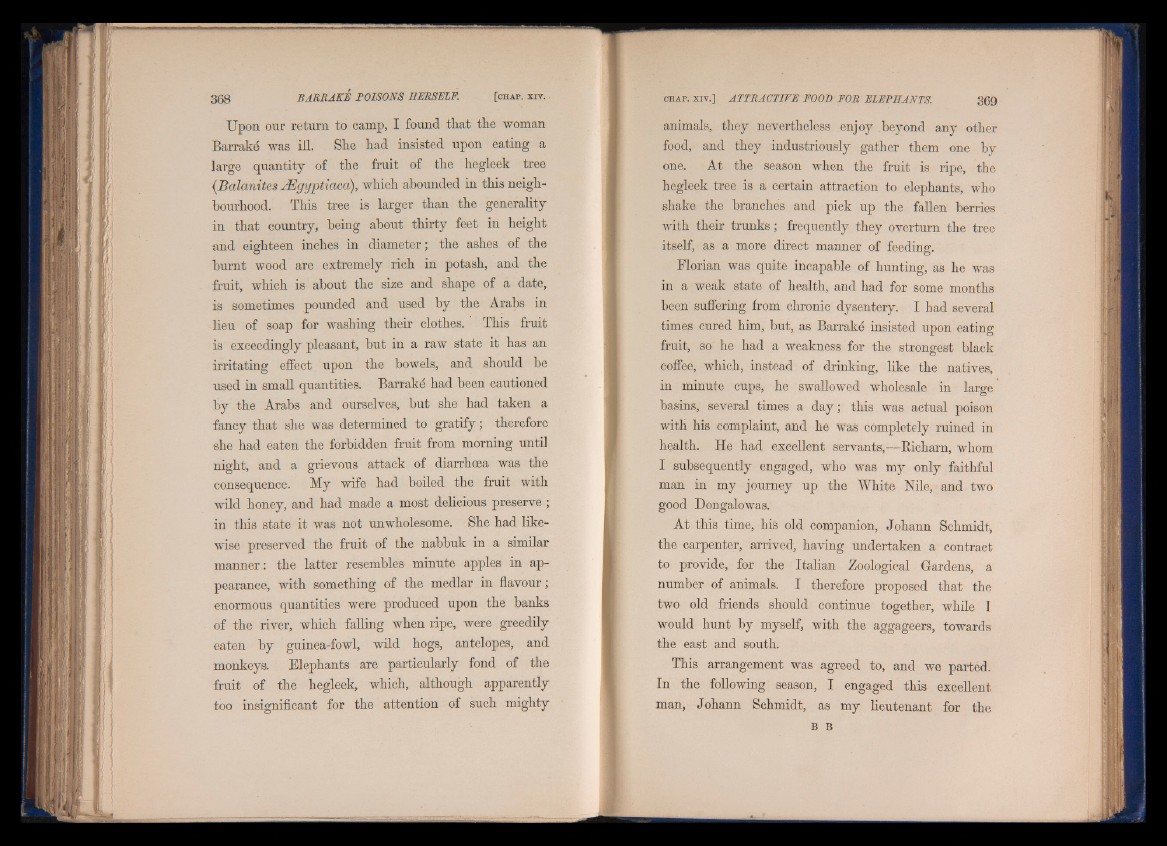
Upon our return to camp, I found that the woman
Barrakd was ill. She had insisted upon eating a
large quantity of the fruit of the hegleek tree
(.Balanites 1Egyptiaca), which abounded in this neighbourhood.
This tree is larger than the generality
in that country, being about thirty feet in height
and eighteen inches in diameter; the ashes of the
burnt wood are extremely rich in potash, and the
fruit, which is about the size and shape of a date,
is sometimes pounded and used by the Arabs in
lieu of soap for washing their clothes. ' This fruit
is exceedingly pleasant, but in a raw state it has an
irritating effect upon the bowels, and should be
used in small quantities. Barrake had been cautioned
by the Arabs and ourselves, but she had taken a
fancy that she was determined to gratify; therefore
she had eaten the forbidden fruit from morning until
night, and a grievous attack of diarrhoea was the
consequence. My wife had boiled the fruit with
wild honey, and had made a most delicious preserve;
in this state it was not unwholesome. She had likewise
preserved the fruit of the nabbuk in a similar
manner: the latter resembles minute apples in appearance,
with something of the medlar in flavour;
enormous quantities were produced upon the banks
of the river, which falling when ripe, were greedily
eaten by guinea-fowl, wild hogs, antelopes, and
monkeys. Elephants are particularly fond of the
fruit of the hegleek, which, although apparently
too insignificant for the attention of such mighty
animals, they nevertheless enjoy beyond any other
food, and they industriously gather them one by
one. At the season when the fruit is ripe, the
hegleek tree is a certain attraction to elephants, who
shake the branches and pick up the fallen berries
with their trunks; frequently they overturn the tree
itself, as a more direct manner of feeding.O
Florian was quite incapable of hunting, as he was
in a weak state of health, and had for some months
been suffering from chronic dysentery. I had several
times cured him, but, as Barrake insisted upon eating
fruit, so he had a weakness for the strongest black
coffee, which, instead of drinking, like the natives,
in minute cups, he swallowed wholesale in large'
basins, several times a day; this was actual poison
with his complaint, and he was completely ruined in
health. He had excellent servants,—Richarn, whom
I subsequently engaged, who was my only faithful
man in my journey up the White Nile, and two
good Dongalowas.
At this time, his old companion, Johann Schmidt,
the carpenter, arrived, having undertaken a contract
to provide, for the Italian Zoological Gardens, a
number of animals. I therefore proposed that the
two old friends should continue together, while I
would hunt by myself, with the aggageers, towards
the east and south.
This arrangement was agreed to, and we parted.
In the following season, I engaged this excellent
man, Johann Schmidt, as my lieutenant for the
B B